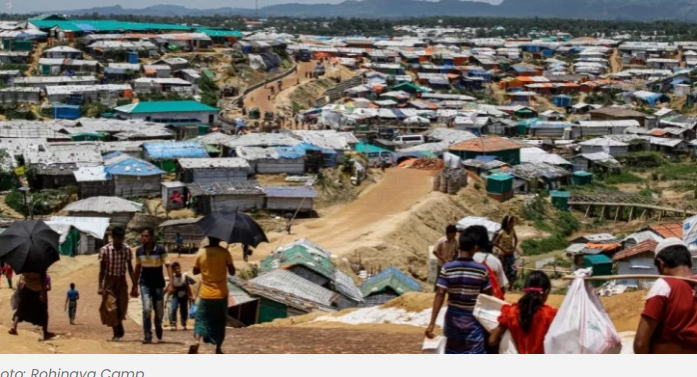Three-day global dialogue on Rohingya crisis begins in Cox’s Bazar on Sunday

A three-day international conference titled ‘Stakeholders’ Dialogue: Takeaways to the High-Level Conference on Rohingya Situation’ will begin in the beach town of Cox’s Bazar on Sunday, as the interim government is trying to actively engage with global stakeholders to address the prolonged Rohingya crisis.
Chief Adviser Prof Muhammad Yunus will visit Cox’s Bazar on August 25 to attend the dialogue.
Disaster Management and Relief Adviser Faruk E Azam, Bir Protik, High Representative for the Rohingya Issue and National Security Adviser of Bangladesh Dr Khalilur Rahman, United Nations Resident Coordinator (UNRC-a.i.) Rana Flowers, Head of the Independent Investigative Mechanism for Myanmar (IIMM) Nicholas Koumjian, UN Special Rapporteur on the situation of human rights in Myanmar Thomas H Andrews and Assistant High Commissioner, UNHCR Raouf Mazou will also attend, a senior official told UNB.
Bangladesh, which is hosting over 1.3 million Rohingyas in Cox’s Bazar and Bhasan Char, is working towards a roadmap for their safe and dignified return to Myanmar.
The dialogue aims to generate concrete recommendations from the participants as the takeaway for the upcoming high-level conference to be held in New York in September, said the Ministry of Foreign Affairs.
This will be a preparatory event for the high-level conference on the Rohingya crisis scheduled in New York on September 30 on the sidelines of the United Nations General Assembly.
The Office of the High Representative for the Rohingya Issue and the Ministry of Foreign Affairs are organising the ‘Stakeholders’ Dialogue’ on the Rohingya crisis in Cox’s Bazar.
Experts both from home and abroad, diplomats, representatives from the Rohingyas, international organisations, and academicians will participate in the dialogue.
They will discuss their views and table propositions to address the Rohingya issue.
The voices of Rohingya men, women and youths will feature prominently, providing the international community an opportunity to hear their perspectives, aspirations and expectations.
The dialogue is also expected to take stock of the different aspects of the crisis including funding gaps for the Rohingyas in the camps, recent developments in Rakhine, dignified repatriation of Rohingyas and a way forward for a sustainable solution of the crisis.
It includes five thematic sessions on humanitarian assistance, confidence-building for repatriation, accountability for atrocities, and ways to a sustainable, time-bound and actionable long-term solution to the crisis.
Chief Adviser’s Press Secretary Shafiqul Alam said two more international conferences are scheduled to be held later this year in New York and Doha. The largest one will take place in the last week of September in New York.
He said Rohingya representatives, delegates from 40 countries, diplomats based in Dhaka and representatives from UN agencies will participate in the Cox’s Bazar conference.
Alam said a special discussion with Rohingya representatives will take place on August 24.
The three-day conference will highlight issues of repatriation, funding and a comprehensive roadmap for the safe return of Rohingyas.
Around 170 countries are expected to join the high-level conference on the situation of Rohingya Muslims and other minorities in Myanmar which will be organised on September 30 in New York on the sidelines of UNGA.
Foreign Adviser Md Touhid Hossain has recently said the government is working on three fronts -- uninterrupted flow of foreign funding, keeping the issue alive amid other global crises and ensuring their safe and dignified return.
“The issue should not be forgotten. We continuously bring it to focus. We are working on three fronts,” he told reporters at the Ministry of Foreign Affairs.
Bangladesh sought intensified humanitarian contributions for Rohingyas, stressing that the pressure on Bangladesh’s economy, environment and local communities is unsustainable.
"We are facing mounting humanitarian, developmental and security-related challenges," Adviser Hossain said recently while speaking at the OIC Ad Hoc Ministerial Committee on Accountability for Human Rights Violations against the Rohingyas.
Bangladesh has shown ‘extraordinary compassion and responsibility’ by sheltering over 1.3 million forcibly displaced Rohingyas despite experiencing a snowballing of the crises.
UNHCR, the UN Refugee Agency, and humanitarian partners are mobilizing to respond to the needs of up to 150,000 Rohingya refugees who have arrived in Cox’s Bazar in Bangladesh over the last 18 months.
Targeted violence and persecution in Rakhine State and the ongoing conflict in Myanmar have continued to force thousands of Rohingya to seek protection in Bangladesh.
This movement of Rohingya refugees into Bangladesh, spread over months, is the largest from Myanmar since 2017, when some 750,000 fled the deadly violence in their native Rakhine State.
Among the new arrivals, nearly 121,000 had been biometrically identified by the end of June, with more believed to be residing informally in the already overcrowded refugee camps.
The overwhelming majority are women and children.
More humanitarian support is urgently required as the new arrivals are largely dependent on the solidarity of those living in the camps, overstretching severely diminished resources.



